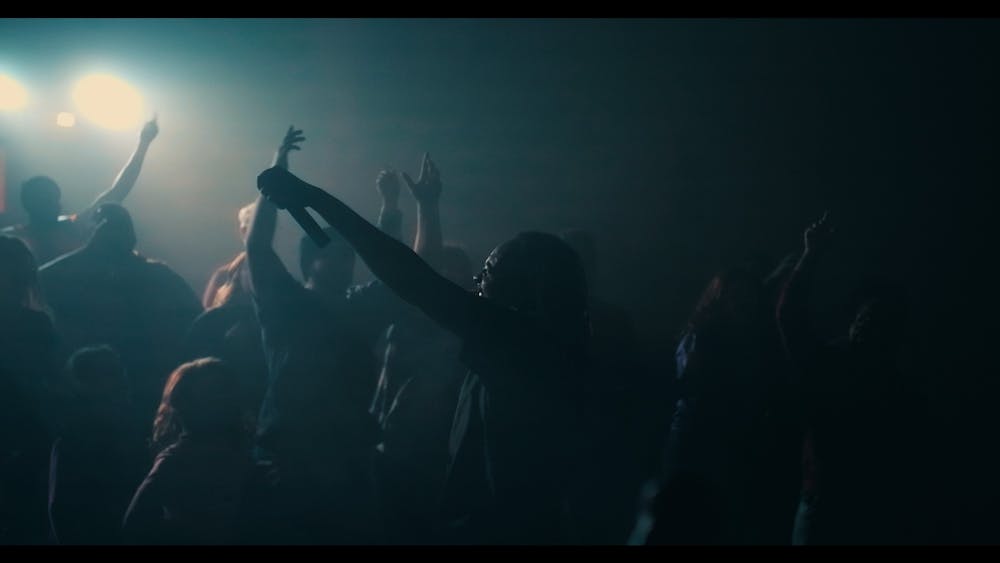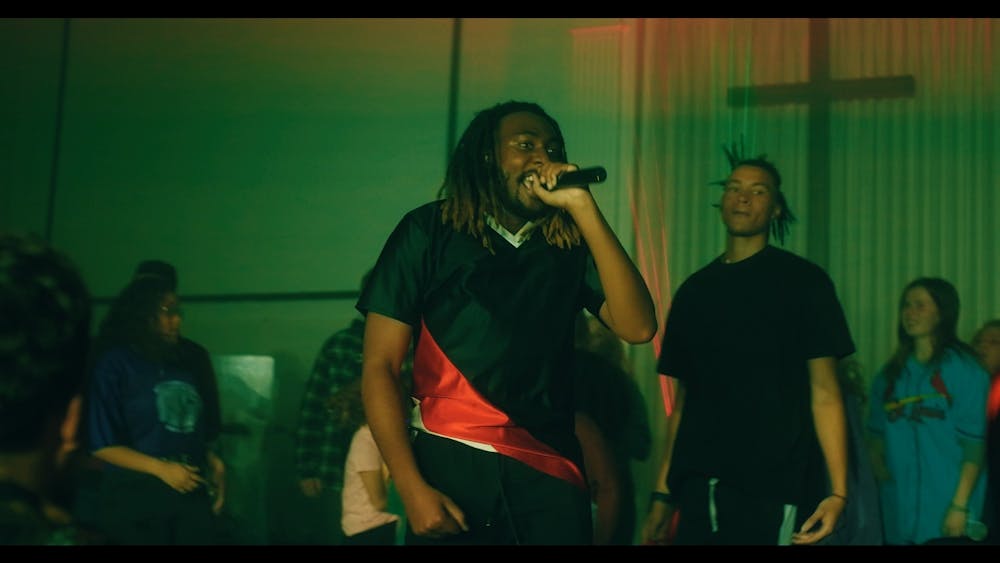When Rome Herbert was about 8 years old, he frequently attended spoken word performances with his mother in Indianapolis and became inspired by its artistry.
“I knew I wanted to do spoken word because of the way [it] could move audiences and evoke emotion,” Herbert said.
However, he was also influenced by music — more specifically, hip-hop and rap.
“Hip-hop was the perfect merger of [spoken word],” Herbert said, “but also … the music people were more into around me.”
Herbert said mental illness was actively present in his childhood. His mother has schizophrenia — a serious medical condition in which some people interpret reality abnormally, according to the Mayo Clinic . He spent most of his childhood moving between his mother’s and grandmother’s homes.
Herbert’s parents lived in the suburbs of northwest Indianapolis, but he lived most often with his grandmother near the city’s east side, according to his website’s biography.
“As a product of Black America’s schizophrenia, I’m referencing this idea Black people in America have to live two different lives — one that is acceptable and assimilating to white America and then code-switching back to Blackness,” Herbert said.
When Herbert was about 12 years old, he devoted himself to becoming a hip-hop artist and sold his first mixtapes at 16 to fellow high school students. He said his strong Christian faith inspired him to pursue a career in music, and the message of his songs and brand would revolve around faith, hope and love — three key qualities that helped him cope with the challenges of his childhood.
Herbert began studying telecommunications at Ball State in 2014 but changed his major to creative writing after taking a creative writing elective. In a class with Brian Morrison, associate teaching professor of English, Herbert said he and his classmates would share poems with each other and offer feedback, which changed Herbert’s songwriting process.
“That [class] helped me a lot to open myself up to critique and improvement from fellow artists, sharing drafts of my songs and getting constant feedback to improve,” Herbert said. “That experience helped me to learn to let others into my process more.”
While attending Ball State, Herbert put on shows on and around campus, including Be Here Now in the Village and Uggly’s Bar and Grill on Muncie’s southside. He carried around a notebook he would invite his fans to write feedback in after shows.
“The word I kept hearing from each one was, ‘bold, bold, bold,’” Herbert said. “A lot of times … fear leaves us feeling stuck and leaves us feeling like we can’t move. I realized music, at its core, is something to listen to instead of fear.”
In 2018, Josh Holowell, lead pastor for the City Hope Fellowship in downtown Muncie, launched an internship where he hired Herbert as one of three interns. He noticed Herbert from his speeches and sermons at Impact ministry at Ball State, which advocates for the Black community and its spiritual leaders.
As an intern, Herbert worked to start a ministry at Muncie Central High School and the Youth Opportunity Center in Muncie. However, the two processes never became fully fledged programs due to COVID-19 concerns, he said.
“He was working really hard to connect with everyone in our city — and it really felt like everyone in our city,” Holowell said. “[Herbert] was kind of influential in organizing some of [the] things we participated in.”
After Herbert’s year-long internship ended, he transitioned to working part-time for the City Hope Fellowship as both the director of outreach and guest preacher for Sunday sermons.
“I think [Herbert] was our most gifted preacher on staff, including myself,” Holowell said. “He had sort of a prophetic bent … he would see and call out injustice or sin… and also bring the hope of Jesus to the situation, always.”
Herbert moved back to Indianapolis in August 2021 but maintains a connection with his fanbase — which he calls “the Romans” — through Thursday evening Twitch streams and a Patreon page.

The greatest reason Herbert moved back to Indianapolis was to be closer to his 86-year-old grandmother, who “made a huge impact” on his life and was getting older and needed more care, he said.
After returning to Indianapolis, Herbert reconnected with Alvin Laguerre, a fellow hip-hop artist and 2021 Ball State graduate who he met through the Impact movement.
“The way [Herbert] speaks and pursues people just has always stuck with me,” Laguerre said. “Just from meeting him, he made me feel known and cared about and heard my story.”
Laguerre said he found out Herbert was also a hip-hop artist from getting to know him. Eventually, they started working together, where their form of discipleship became music.
As a fellow hip-hop artist, Laguerre goes by the name “Alvin the Architect,” alluding to both his architecture studies at Ball State and the mission behind his songs of building people up against fear, anxiety and self-doubt.
Laguerre also immigrated to the U.S. in 2009 from Port-au-Prince, the capital of Haiti.
“When I immigrated to the United States, I faced a lot of those feelings, so it’s only natural my
music would reflect this and show we can overcome through faith, hope and love,” Laguerre said.
Laguerre and Herbert meet every Monday to spend time together and compose music, with Laguerre as the producer and Herbert acting as the lyricist and songwriter.
“I think it’s funny because my sound is completely different from Rome’s sound,” Laguerre said.
Herbert is currently working on an EP for his Patreon supporters, “For The Bold,” as well as producing singles to release on Spotify each month this year, though he said he has several other aspirations, like releasing new merchandise or some sync licensing.
Although he continues expanding his brand and developing as an artist, Herbert said the message of his songs continue revolving around faith, hope and love.
“For music, specifically, my main call is I want you to experience being bold and fighting against fear,” Herbert said.
Contact Miguel Naranjo with comments at miguel.naranjo@bsu.edu.





